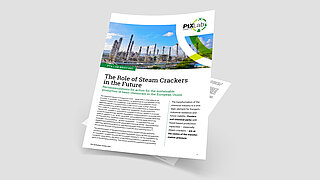PtX Lab Lausitz formulates recommendations for climate-neutral European basic material production
Copyright: shutterstock/pooooom
PtX Lab Briefing „The Role of Steam Crackers in the Future“ shows how the transformation of the chemical industry, especially energy-intensive steam crackers, can be achieved.
The transformation of the chemical industry can only succeed if political and economic conditions are aligned. This is the conclusion reached by the authors of the recently published PtX Lab Briefing ‘The Role of Steam Crackers in the Future – Recommendations for action for the sustainable production of basic chemicals in the European Union’.
As part of the PtX Lab Talk+ series of events, co-authors Martin Hock, expert at PtX Lab Lausitz, and Dr Clemens Schneider, research associate at the Kassel Institute for Sustainability, provided insights into the results of the study. These make it clear that the transformation of the chemical industry is not only technologically challenging, but also requires forward-looking planning, strong networks and reliable industrial policy framework conditions.

Copyright: PtX Lab Lausitz
The Role of Steam Crackers in the Future
PtX Lab Briefing | 10/2025 I Topic: Sustainable chemistry I 14 pages
The PtX Lab Briefing ‘The Role of Steam Crackers in the Future – Recommendations for action for the sustainable production of basic chemicals in the European Union’ focuses on fossil fuel-powered cracking plants for the production of basic chemicals, known as steam crackers. These plants are responsible for high CO₂ emissions, but as central entry points for chemical value creation, they also offer great leverage for innovation and decarbonisation.
Recommendations for action for Europe's chemical industry
To strengthen the resilience and innovative power of the European chemical industry, the authors propose a balanced transformation approach based on two principles: combining climate-neutral steam crackers and a sustainable methanol economy (principle A) with the transformation of industrial clusters and chemical parks (principle B).

Copyright: PtX Lab Lausitz / Steffen Rasche
Since inconsistent ownership structures complicate the transformation of clusters and chemical parks, cluster initiatives should take precedence over individual projects in order to promote systemic change.
About the Policy Brief
The PtX Lab Briefing ‘The Role of Steam Crackers in the Future – Recommendations for action for the sustainable production of basic chemicals in the European Union’ was developed by the PtX Raw Materials department, which focuses primarily on the transformation of the chemical industry and the sustainable use of resources. The 14-page publication was produced under the direction of Martin Hock, Dr Irina Akhmetova and Lukas Horndasch.
About the PtX Lab Talk+ series
The publication of the PtX Lab Lausitz was presented as part of the two-part PtX Lab Talk+ event series on the topic of ‘Clusters, Crackers & Beyond: Towards Climate-Neutral Chemical Production in Europe and Beyond’. These events were organised in collaboration with the International Sustainable Chemistry Collaborative Centre (ISC3).
In the first online event, Martin Hock and Dr Clemens Schneider, under the expert guidance of PtX Lab Lausitz, focused on steam crackers. Jaroslaw Jelinek, Vice President of Product Management at Vioneo, added an economic perspective to the discussion.
International perspectives complemented the debate, which was moderated by Dr Thomas Wanner, Managing Director of ISC3, in the second digital discussion round. Dr Savanit Boonyasuwat, Deputy Chairwoman at PTT Global Chemical, presented the Thai perspective on PtX innovations – with projects on biodegradable plastics, circular economy for PET bottles and sustainable aviation fuels (SAF). Dr Samir Rachidi, Director General at IRESEN, provided insights into the opportunities that solar energy offers for the chemical industry in North Africa.
Contact
Dr
Sarah Bernhardt
Head of Section PtX Basic Materials
+49 173 56 150 72
Write E-Mail
more information

